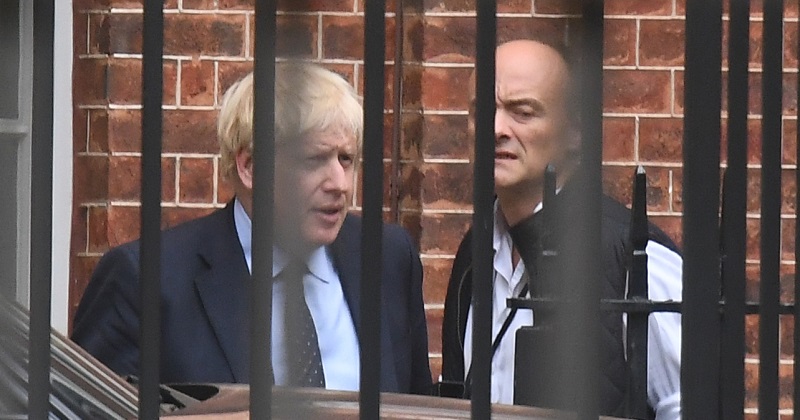Schools have been hurled into the centre of a “culture war” by the publication of unexpected guidance thought to have originated in Downing Street that targets divisive educational issues.
This has all the hallmarks of having been thrown in by No 10 in the expectation that there will be a massive row
Documents supposedly meant to complement statutory guidance on relationships and sex education were published last Thursday by the Department for Education.
But the foray into issues such as “cancel culture” and transgender rights, plus a specific diktat not to promote anti-capitalism, have prompted warnings that schools are getting caught up in a highly-politicised dispute.
The guidance has also caused confusion and even fear among school staff, with leaders worried that it could stifle discussion and debate of political issues in schools.
However some groups, including those who feel that pupils are being pressured by schools and organisations to change gender, have welcomed the documents.
Representatives of more than 30 organisations promoting political and citizenship education – including Shout Out UK, the Association of Citizenship Teaching and the Centre for Education and Youth – have written to education secretary Gavin Williamson.
They warn that the guidance serves “to deny students the opportunity to engage with material from ‘extreme’ sources in a classroom environment”.
Leaders have also questioned the purpose of guidance that seems to stray beyond the teaching of relationships and sex education. Julie McCulloch, head of policy at school leaders’ union ASCL, described it as “decidedly odd”.
She added: “While there are elements which are helpful, it lurches somewhat clumsily into the territory of issues such as ‘cancel culture’ and appears to object to the discussion of certain political perspectives, even though it is difficult to see what this has got to do with relationships and sex.”

The documents were published by the DfE, but several sources told Schools Week that the decision to do so, and the topics the guidance covered, actually originated in Downing Street.
They fear that it is part of a deliberate government attempt to distract attention from its handling of coronavirus and other education issues.
One source familiar with the development of the guidance said it was “straight out of the playbook” of senior Johnson aides Dominic Cummings, Lee Cain and Munira Mirza.
“Fighting a fight against the establishment is what brought this coalition of people together. Now they are an establishment, they need a new enemy. So they create wedge issues that focus on the extreme, because the minute they debate policy the coalition fractures.
“After all, why debate whether you could amend the EBacc or tweak the national funding formula when you can argue about Winston Churchill statues getting knocked down, and teenagers getting knocked up.”
Last year, The Times reported that Downing Street had been polling on “culture war” issues such as trans rights – which feature in the guidance – to see if they could be “weaponised” in an election.
Dr Mary Bousted, joint general secretary of the National Education Union, said the guidance bore “all the hallmarks of having been thrown in by Number 10 in the expectation that there will be a massive row”.
But she added: “The more we engage with them in culture wars, the more they get off and escape the litany of incompetence, which is where we need to focus.”

The blurring of the lines between RSE and other subjects areas in the guidance – much of it under the heading of “respectful relationships” – is a cause for concern among teachers of those subjects.
They mocked the guidance on social media this week, pointing out that it could preclude the study of certain fundamental aspects of the curriculum.
“Just wait till they hear about that Jesus fella they talk about in RE,” one teacher tweeted.
In particular, citizenship teachers fear that the broad nature of the documents could lead schools to avoid discussing difficult topics altogether.
Liz Moorse, chief executive of the Association of Citizenship Teaching, was one of the signatories of the letter to Williamson. She says teachers have been calling her organisation with serious concerns.
“Comments that have come through include, ‘is this another section 28?’, ‘is this some way of limiting or censoring what schools should do?’, and that’s deeply worrying.

“It is pretty desperate. Some of the teachers who have contacted me have said they are frightened by this advice, and that is really a very worrying place to be.”
The DfE was forced to clarify on Monday that the guidance is non-statutory, meaning schools have no legal duty to follow it.
The department is said to be working on a statement clarifying its “intent”.
But the government claims it is simply trying to help schools to prepare for the teaching of RSE, which becomes compulsory this year.
The guidance has been welcomed by Transgender Trend and the Safe Schools Alliance, which have previously claimed that pupils are being pressured to change gender.
They welcomed the call for schools to avoid reinforcing stereotypes.
The Campaign for Common Sense, which says it promotes “grown up discussion and debate”, also said that the guidance was important because it “reminded schools of their long-standing legal obligation to cover political issues in a balanced manner”.
Mark Lehain, a former headteacher and Conservative candidate who set up the campaign, claimed this week that schools were “creating division among pupils” in the way they teach about anti-racism.
“There are better ways to deal with disparities in society than imposing political ideologies on kids,” he tweeted.

But others feel it has just sown more confusion. The LGBT charity Stonewall, whose resources are promoted by the DfE in its statutory guidance on RSE, said that “confusing wording and a lack of practical suggestions means the guidance won’t meet the needs of many teachers and young people”.
Stonewall added: “The DfE guidance only tells teachers what they shouldn’t teach about, rather than what they should.”
ASCL’s McCulloch added that the new advice must not stifle “healthy debate”.
“There is a danger that the introduction of a political complexion muddles the objective, which is to equip young people to enjoy safe and fulfilling relationships,” she said.
“We don’t know exactly why this has happened, but it will inevitably give rise to suspicion of political meddling.”
Nick Gibb, the schools minister, said the guidance would “equip all schools to provide comprehensive teaching in these areas in an age-appropriate way”.
He added: “These materials should give schools the confidence to construct a curriculum that reflects diversity of views and backgrounds, whilst fostering all pupils’ respect for others, understanding of healthy relationships, and ability to look after their own wellbeing.”
Downing Street was approached for comment.
Spot the difference: How the new guidance strays from the original rules
Cancel culture and no-platforming
New guidance: “Explain the harm caused by ‘cancel culture’ and the importance of freedom of speech and freedom of association to a tolerant and free society. Teach that censorship and ‘no platforming’ are harmful and damaging.”
Statutory guidance: “[Pupils should] know the importance of respecting others, even when they are very different from them (for example physically, in character, personality or background), or make different choices or have different preferences or beliefs.”
Gender stereotypes
New guidance: “You should not reinforce harmful stereotypes, for instance by suggesting that children might be a different gender based on their personality and interests or the clothes they prefer to wear.
Materials which suggest that non-conformity to gender stereotypes should be seen as synonymous with having a different gender identity should not be used and you should not work with external agencies or organisations that produce such material.”
Statutory guidance: “Sexual orientation and gender identity should be explored at a timely point and in a clear, sensitive and respectful manner. When teaching about these topics, it must be recognised that young people may be discovering or understanding their sexual orientation or gender identity.”
‘Extreme political stances’
New guidance: “Schools should not under any circumstances use resources produced by organisations that take extreme political stances on matters. This is the case even if the material itself is not extreme, as the use of it could imply endorsement or support of the organisation.
Examples of extreme political stances include, but are not limited to a publicly stated desire to abolish or overthrow democracy, capitalism, or to end free and fair elections.”
Statutory guidance: Not specifically covered.








I’m not surprised. The Gove/Cummings partnership created division at the DfE pitching the ‘good’ teachers (ie those who agreed with Gove) against the ‘bad’ (the rest). Now there’s a not-too-subtle attempt to stifle debate in schools as if discussing something always means promoting it.
It’s unclear what ‘extreme political stances’ have to do with relationship and sex education unless, perhaps, the missionary position has become a political issue.
If the guidance really is this stupid, schools should just ignore it. The problem is solved and schools retain their credibility by taking the lead on a moral issue. This sort of nonsense is designed by irritants like Cain and Mirza and sycophants like Lehain to be divisive. By failing to just bin it move on, school and system leaders are falling into the trap.
Sorry, can I just be clear that the headline saying this is all about “Cummings’s culture war” comes from one quote from an anonymous source who said this guidance was “out of the playbook of Dominic Cummings”?
So the anonymous source didn’t even say this came from Cummings, merely that it looked like the sort of thing he’d do?
I know that using Dominic Cummings is the modern equivalent of Michael Gove (always reliable to stir up a bit of righteous indignation – just see the above) but this really does seem like weak dog-whistle stuff.